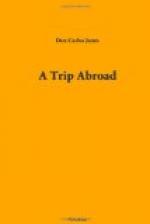Leaving Baalbec, I went down to Rayak and on to Beyrout again. This old city is said to have been entirely destroyed in the second century before Christ. It was once a Roman possession, and gladiatorial combats were held there by Titus after the destruction of Jerusalem. An earthquake destroyed it in 529, and the British bombarded it in 1840. The population is a great mixture of Turks, Orthodox Greeks, United Greeks, Jews, Latins, Maronites, Protestants, Syrians, Armenians, Druses, and others. A great many ships call here, as this is the most important commercial city in Syria. The numerous exports consist of silk, olive oil, cotton, raisins, licorice, figs, soap, sponges, cattle, and goats. Timber, coffee, rice, and manufactured goods are imported. At one time Arabic was the commonest language, and Italian came next, but now, while Arabic holds first place, French comes second. The British, Austrians, Russians, and perhaps the French, maintain their own postoffices. Considerable efforts are being made by American, British, and other missionary institutions to better the condition of the natives. The American Mission, conducted by the Presbyterians, has been in operation more than seventy years. A few years ago they had one hundred and forty-three schools and more than seven thousand pupils. The Church of Scotland has a mission for the Jews. The British Syrian Mission was established in 1864.
Beyrout has comparatively little of interest for the traveler. I walked out to the public garden one morning and found it closed, but I do not think I missed much. As I went along from place to place, I had opportunity to see the weavers, wood-turners, and marble-cutters at their work. I stopped at a small candy factory, equipped with what seemed to be good machinery for that kind of work. One day I watched some camels get up after their burdens of lumber had been tied on. They kept up a peculiar distressing noise while they were being loaded, but got up promptly when the time came. When a camel lies down, his legs fold up something like a carpenter’s rule, and when he gets up, he first straightens out one joint of the fore legs, then all of the hind legs, and finally, when the fore legs come straight, he is standing away up in the air. The extensive buildings of the American College were visited, also the American Press, the missionary headquarters of Presbyterians in America. On the third of October the Khedivial steamer Assouan came along, and I embarked for Haifa, in Galilee.
CHAPTER IV.
A FEW DAYS IN GALILEE.




